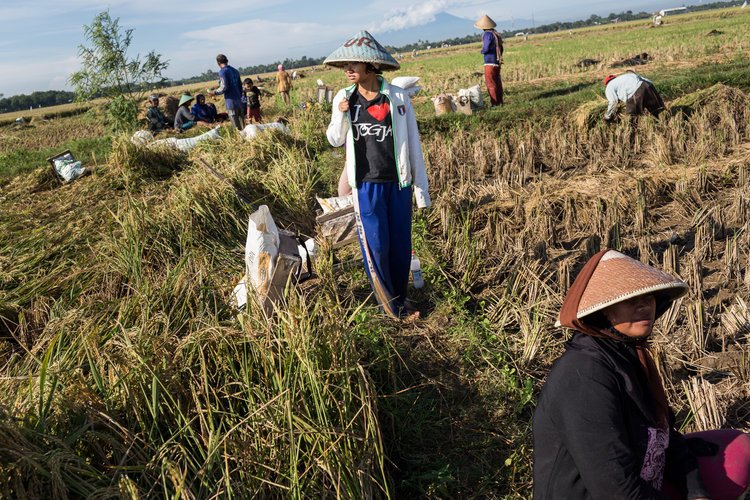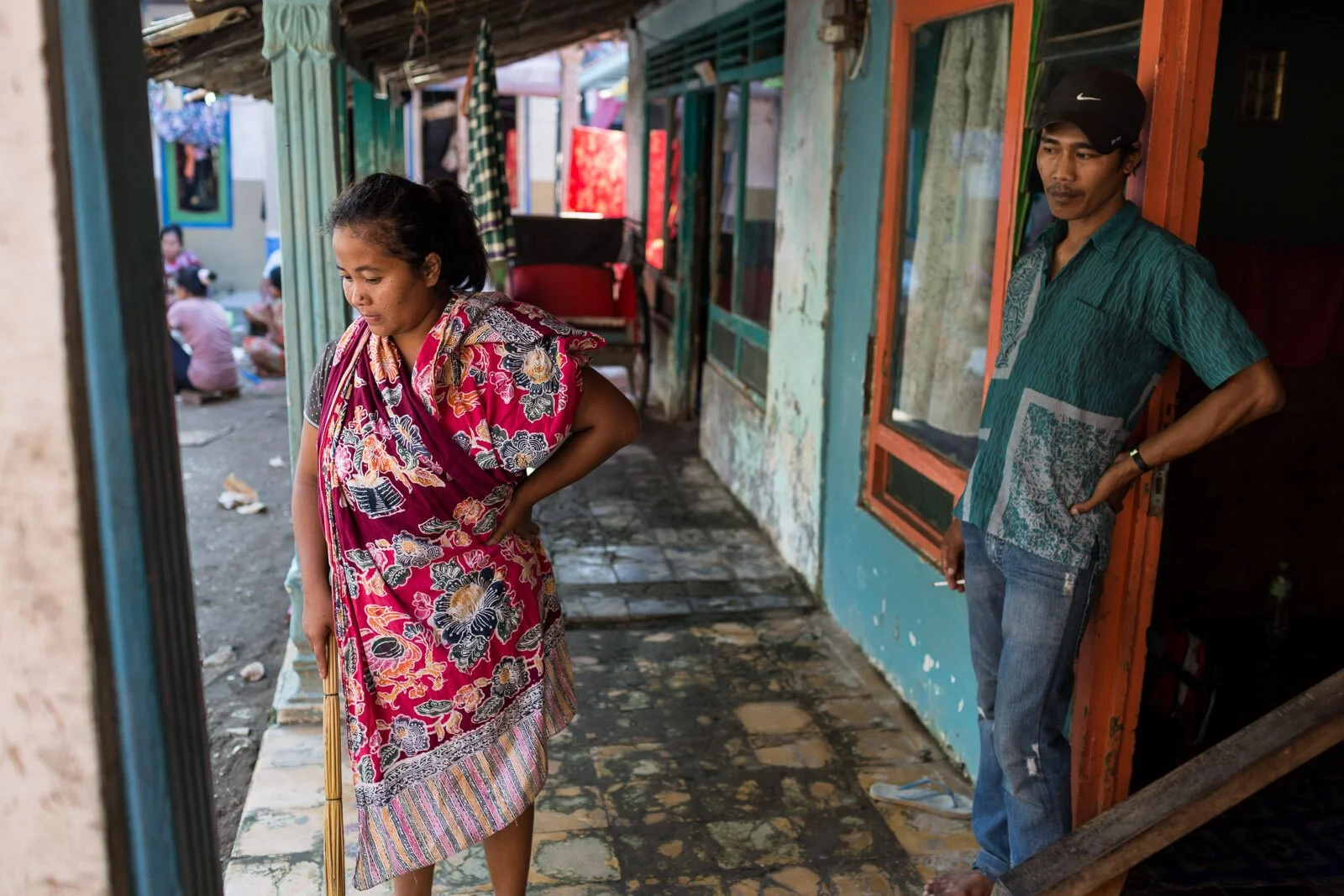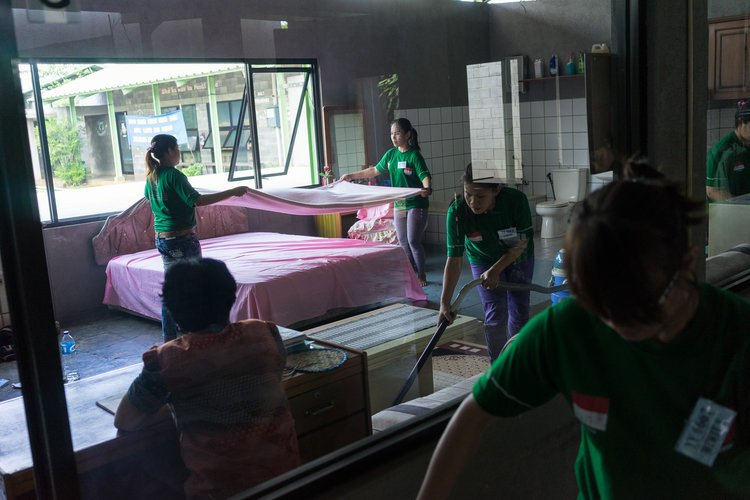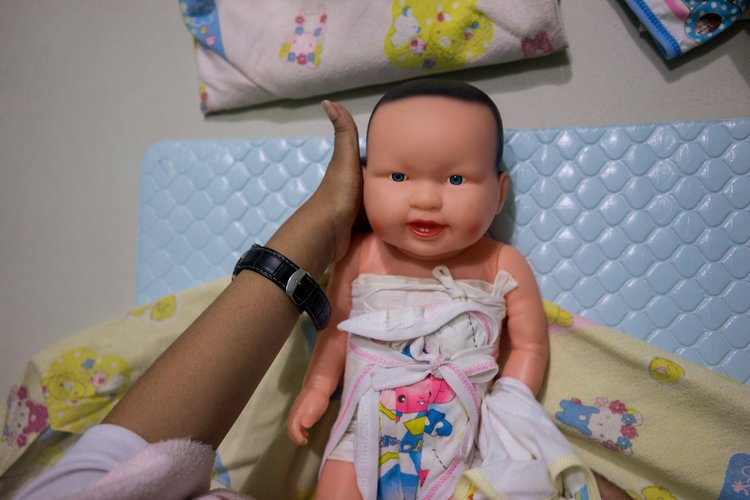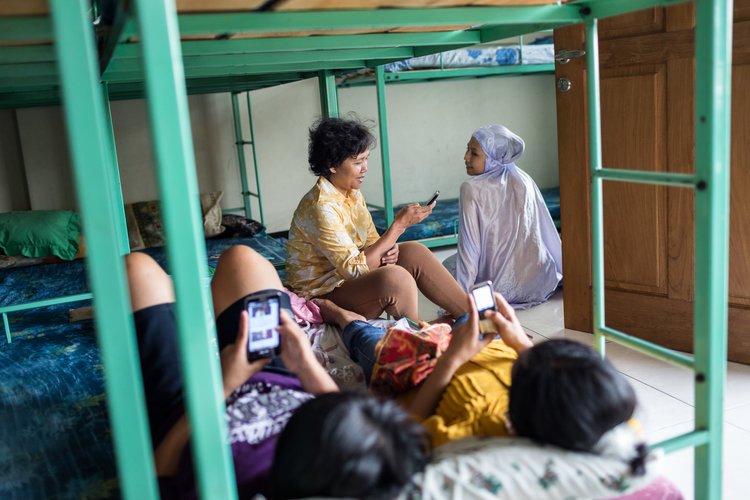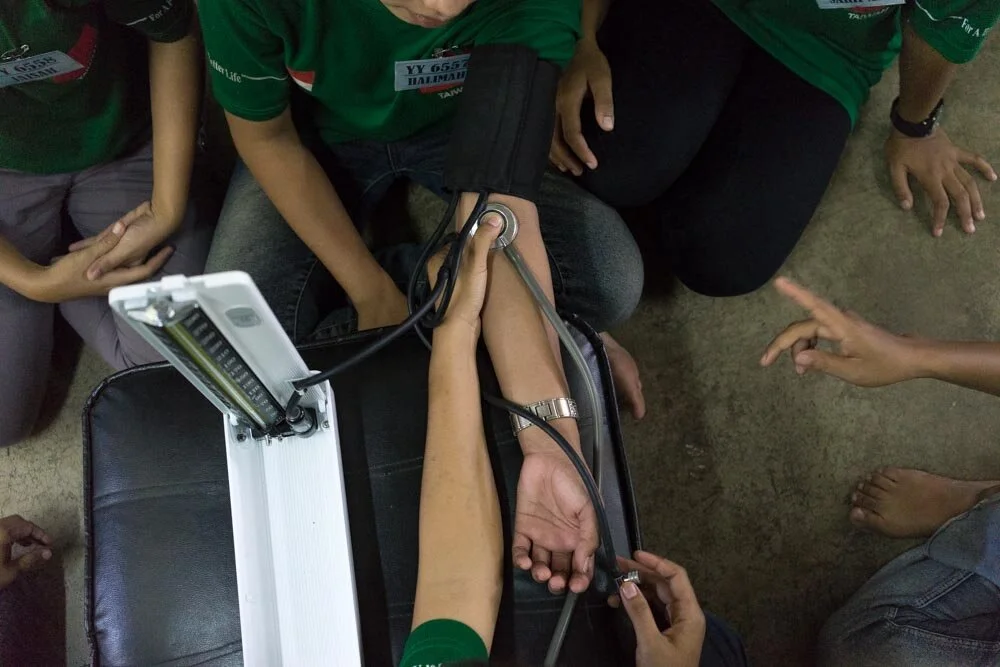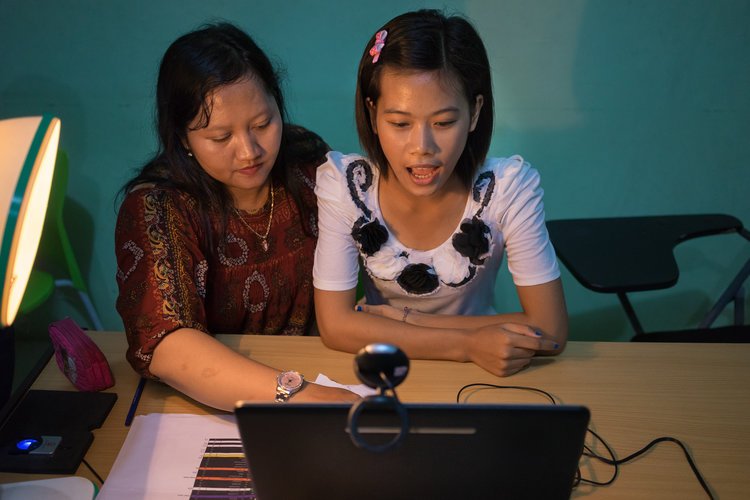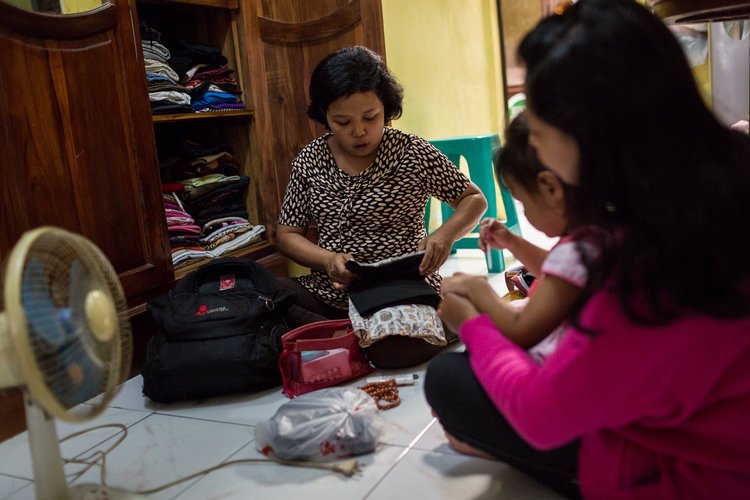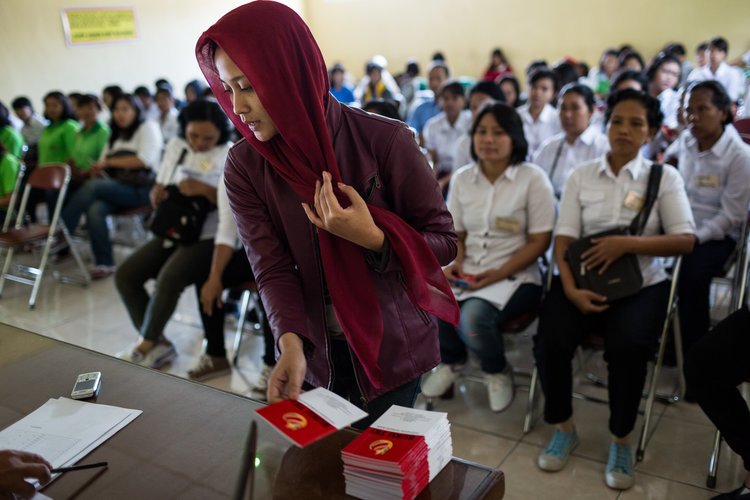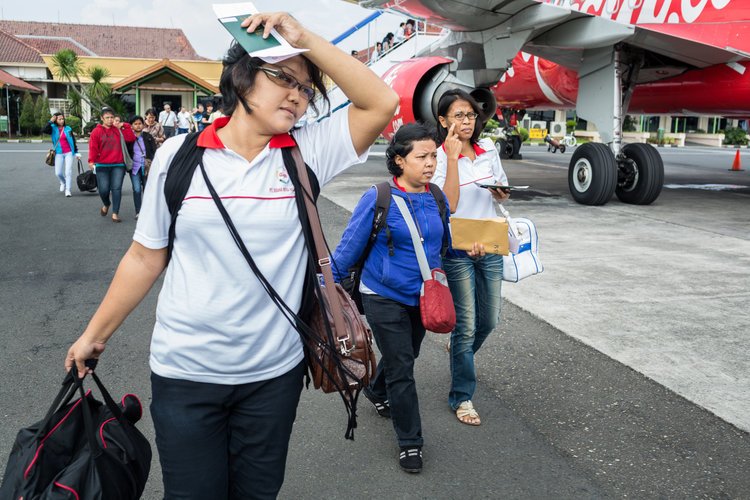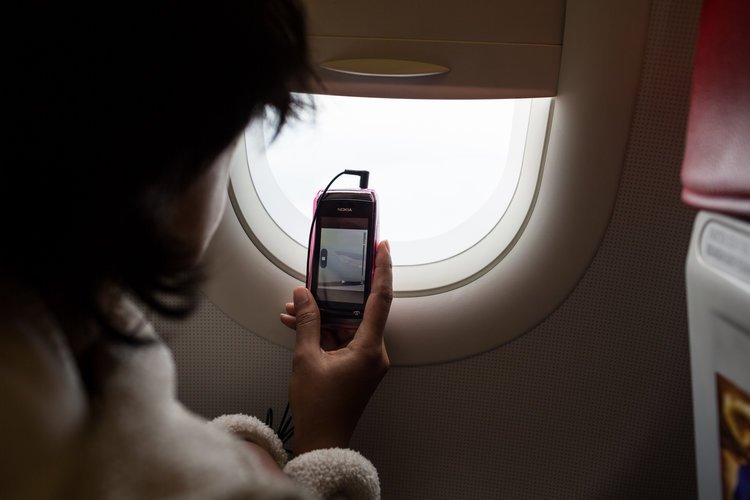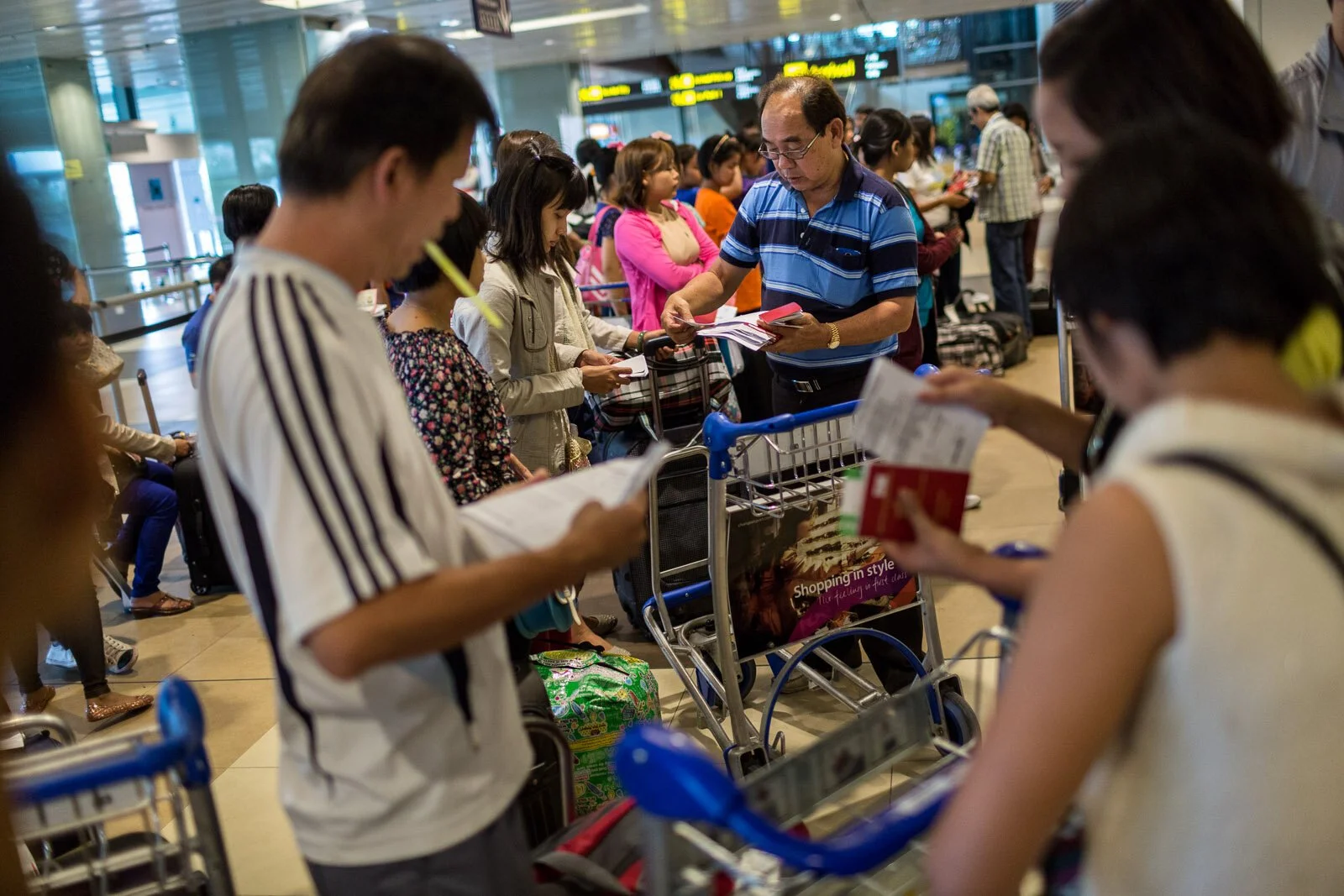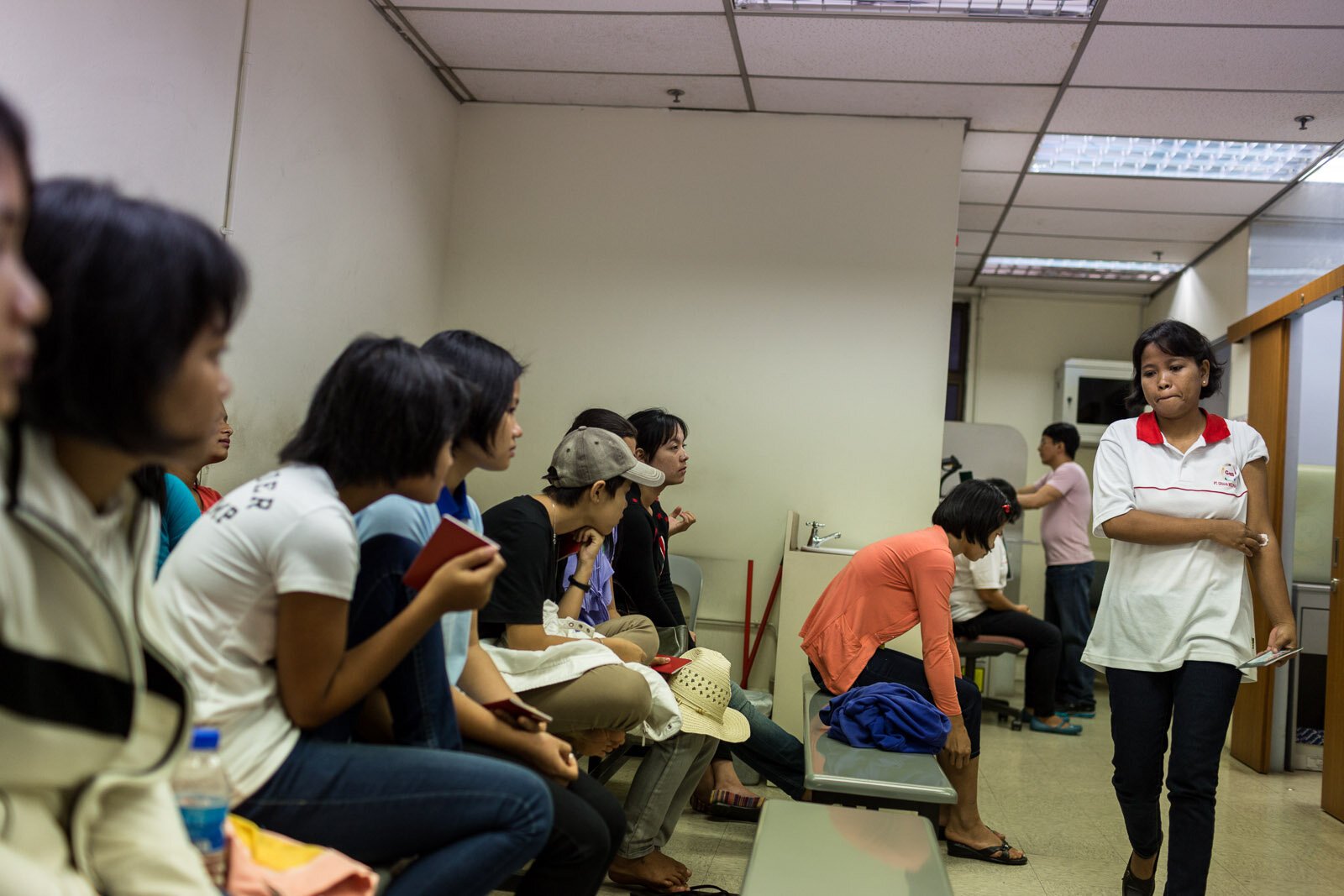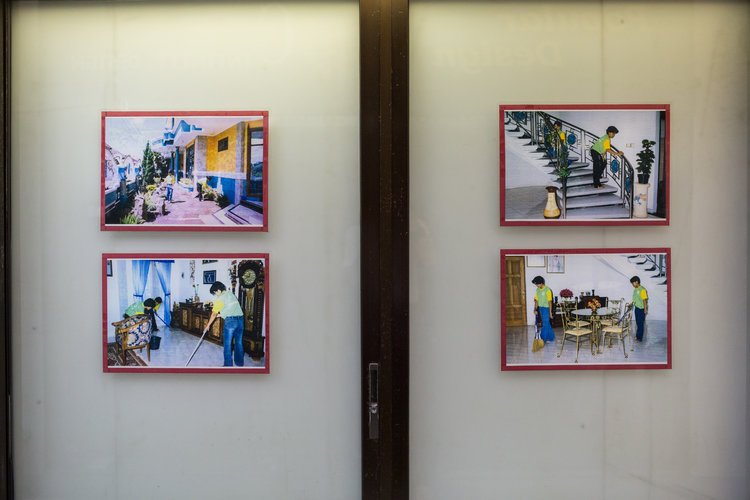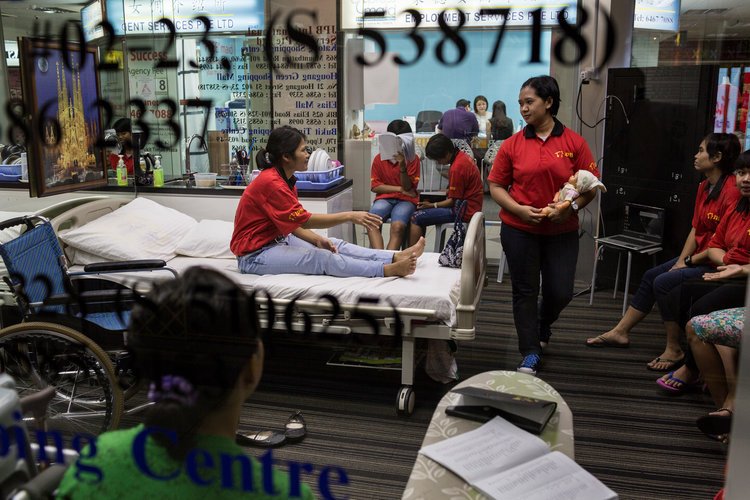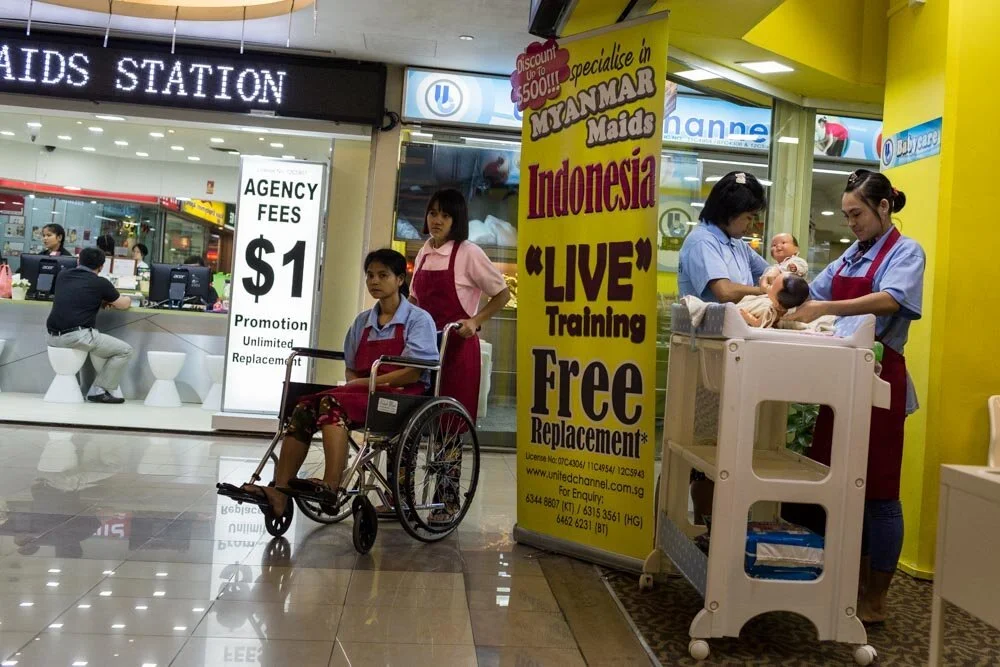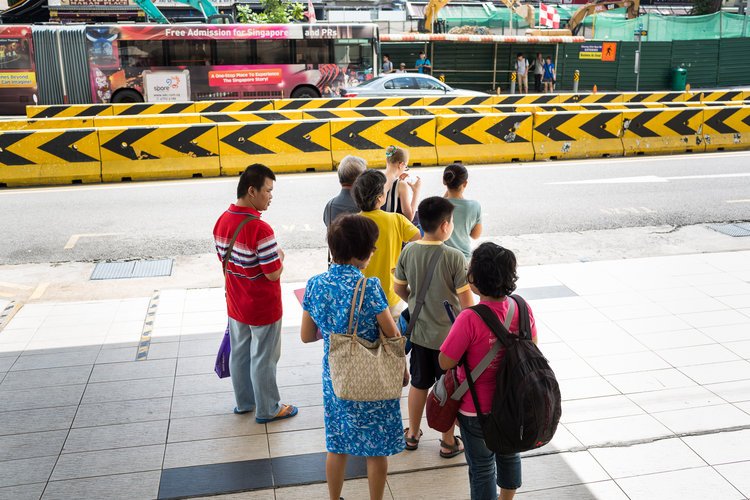
Dreaming Singapore
Introduction
Working in the afternoon sun, Aneda, a 24-year-old farmer from Indonesia, deftly holds her knife as she cuts away at the full-grown stalks. She gathers the stalks into bundles, and later beats the bundles against a wooden board. The precious grains — which she has seen grow over the past 6 months — spill onto a green net.
“I suppose we don’t get much,” says Aneda, who works the fields alongside her mother. “In one day we might get 50 trays of threshed rice.”
Similiar scenes are enacted all over Aneda's province, Indramyu, a region of scattered villages and endless rice-fields. The region produces 3 percent of Indonesia's total rice, an astonishing amount for a small province on the tip of Java.
But apart from providing food, Indramayu nourishes another important demand: migrant workers. What follows is a portrait of their lives, told from the perspective of three Indonesian women as they leave their homes in search of work.
April 26, 2014 - Indramayu (Indonesia). Aneda works in a rice field in the outskirts of Dadap. She recently returned from working in Singapore and like her co-workers she earns bags of rice in exchange for her labour. Aneda’s family are not landowners, so they work on other people’s farms. © Nicolas Axelrod / Ruom
Another Life
Each year, men and women leave this region in their hundreds — for places as varied as Kuwait, Hong Kong and Singapore. Foreign lands offer what home cannot — an escape from poverty. But the dream of earning money abroad often goes awry. In order to leave, most take on large debts during the recruitment and training stage. These debts later create the conditions for a pliable workforce – willing to work long hours but afraid to complain about exploitative conditions.
Problems are especially acute for female domestic workers, who work in private residences and who make up the majority of Indonesia’s 6.5 million migrants.
According to the ILO, up to 80 per cent of these domestic workers endure isolation, underpayment, long working hours, forced labour, human trafficking and violence.
The lives of these women are never far from the news. Stories of abuse, exploitation and excessive debts are common, with a high proportion of problems coming from the Middle East. In Saudi Arabia alone, 33 Indonesian women, mostly domestic workers, are on death row, facing charges of adultery, assault, and even witchcraft.
Indonesian fishermen are also regularly trafficked to work on fishing boats. They work long hours, sleep in cramped quarters and are often underpaid — exactly the experience Samudi had when he was worked on Taiwanese fishing boat in 2012, where he received 20 dollars a month. He and his fellow fishermen did not touch land for 10 months.
Samudi's wife, Kanipah, was also exploited as a domestic worker in Qatar. She was paid 20% less than she was promised, worked long hours and says she met many other domestic workers with similar complaints.
Not all experiences are this extreme. The life of a migrant worker can often feel like a gamble, and much depends on the employers one receives and the laws of host countries. Many return better off, with money to build new houses and send their children to university. Some open up new businesses, which in turn stimulates local development.
There are even roads known as "migrant lanes", rows of houses built with the wealth of migrant remittances. Thick with fresh paint, the houses stand as living proof, as proud boasts even, that success abroad is possible.
But for all their grandeur, the houses illuminate a hard truth, especially for women like Aneda. If Indramayu provides family and security, it offers little in the way of opportunity. For every 5 kilograms of rice she harvests, she receives 1 kilogram in payment.
Aneda's story is particularly revealing. Earlier this year, she lived in Singapore as a domestic worker, where she says she was overworked, underpaid, and mistreated. 6 months after arriving, and despite the huge debts she took on in order to migrate, she asked to be released from her contract. She barely broke even.
Aneda is not the first in her family to seek work abroad. A shy, quietly spoken woman, she reveals that 9 years ago, her sister went to Kuwait as a domestic worker. She lost touch with the family 4 years ago and has not been heard of since. To this day, there has be no formal investigation into the matter.
Nevertheless, Aneda still wants to try her luck overseas. "In the future, I want to go to Taiwan. My friend said the salaries are higher there. And when my contract is finished and I'm back home,
I [will] build a new house.”
If Aneda goes to Taiwan, she is determined her fortunes will be different.
Preparing for Singapore: A Migrant's Journey
Crossing the strait
The flow of migrants from Indonesia to Singapore is one of the busiest migratory pathways in South-east Asia. There are currently 220,000 domestic workers in the country, the majority of whom are Indonesian.
Working conditions in the country vary enormously. Many are rewarded fairly for their work, and end up with caring families. They are adequately fed, given proper accommodation, and granted a day off every week.
But for thousands of others, life in Singapore is characterised by high debts, unreasonable working hours and limited labour rights.
There are also many cases of abuse. HOME, a migrant workers advocacy group, registered 47 cases of physical abuse in 2014, as well as 9 cases of sexual harassment. The NGO has also registered complaints about poor living conditions, unjustified salary deductions, and horrific cases of food deprivation.
With its wealth and international standing, social workers say Singapore should be a leading light in Asia, a model of labour relations for other countries to follow. But the reality is far from ideal.
There is no minimum wage in the country, and domestic workers receive no union representation. Domestic workers are also excluded from the country’s Employment Act – a cornerstone of labour legislation that grants workers a mandatory day off, regulated working hours, and the right to change employers.
For Jolovan Wham, executive director of HOME, this is the root of many problems. He says that if the government is serious about improving the livelihood of its domestic workers, a fundamental revision of legislation is needed.
When this map was made, Singapore, governed by the British East India Company, was experiencing a massive tide of immigration and growth due to its open immigration and free trade policies. Dated and copyrighted to J. H. Colton, 1855. Published from Colton's 172 William Street Office in New York City. Issued as page no. 31 in volume 2 of the first edition of George Washington Colton's 1855 Atlas of the World .This work is in the public domain in the United States, and those countries with a copyright term of life of the author plus 100 years or less.
The recruitment process
But problems in Singapore are exacerbated by problems in Indonesia.
Wahyu Susilo of Migrant Care, a Jakarta-based NGO, says that aspiring migrants must overcome various barriers at home before they are sent abroad, including unscrupulous brokers, crowded training centres, and exorbitant fees.
For many new recruits, the training is relatively straightforward. Women are taught how to perform basic household tasks and armed with knowledge about their basic rights and entitlements. Their fees are set at government regulated levels, and they are given adequate food and accommodation.
But for many others, the process is full of exploitative practices, including deception about the cost of training, confiscation of personal documents, and insufficient provisions.
“There were no mattresses and no pillows,” Wati, a domestic worker, remembers of her training centre 16 years ago. “We had to sleep on the floor.”
Wati (not her real name) also recalls showering in groups of seven women or more, all of them standing in their clothes. They were too shy – and too religious – to remove them.
“I stayed for two months,” Wati said, “but some women stayed for five months or longer.”
Many facilities have improved since Wati's experience from the late 1990's, but inadequate provisions are still common complaints, according to Susilo of Migrant Care. “We are always finding migrant workers in cramped rooms and living with poor sanitary conditions. In one case we found 200 migrant workers sharing two or three toilets."
These practices flourish in Indonesia because of weak governmental oversight and poor law enforcement, says Susilo, who added that the government urgently needed to develop stronger policies to protect its migrant population.
Of particular concern are unlicensed brokers – also known as 'sponsors' – who recruit aspiring migrants from towns and rural villages, relying on networks and contacts they have built over years of recruiting.
Many sponsors abide by the law and perform what they see as a vital service, finding jobs for domestic workers both abroad and in Indonesia.
But Migrant Care says that many sponsors actively deceive women. "On many occasions the information women are given is not correct," says Susilo. "The salary is not the same as what was promised and the women receive something else. This lack of transparency at the beginning is the cause of many problems.”
He also says that some sponsors charge excessive recruitment fees, which women pay by taking out high-interest loans. Interest rates can be as high as 60 percent, with loans typically in excess of $2000.
He added that under-age migrants are sometimes recruited under conditions indicative of trafficking.
"Their ages are falsified. They are made to pay large sums of money and wind up trapped in debt. These are workers who, according to ILO, should be working 8 hours a day, but in reality it's more like 24 hours a day."
Gatot Abdullah Mansyur, former head of the Agency for the Placement and Protection of Indonesian Migrant Workers (BNP2TKI), says that the government has improved practices in recent years by introducing a national licensing system for both recruiters and migrants.
"Recruiters are registered with us and we provide them with an official identification card and training on how to recruit would-be workers ethically, so that the recruitment process is not coercive or exploitative."
He says that migrants without government-issued cards were barred from leaving the country, and that the government regularly inspected recruitment agencies and acted on tip-offs alleging illegal practices.
Training
Security checks have improved along border points, but NGOs say exploitation is still a regular feature of the training stage, a mandatory process which occurs at specialised centres around the country and which takes forty days to complete.
Some women are also forced to take contraception injections, according to a 2013 report by Amnesty International. Centres can make hundreds of dollars from an individual — taken as salary reductions once a migrant begins earning — and since women cannot go abroad if they are pregnant, some agencies protect women like commodities.
The confiscation of personal documents, in order to keep women from running away, is also a common practice.
According to Migrant Care, these and other problems would be solved by ending the domination of private companies over the training process. The NGO says that the women are the victims of an unregulated market driven by greed.
But for Eka Salim, who runs a training center in Semerang, the problems lie with unethical companies, not with the industry as a whole. He says that many companies are offering legitimate services: charging money in return for accommodation and training. But problems arise, he says, when centers cut corners in order to maximize profits — a practice which leads to inadequate training, insufficient food and accommodation, and occasionally to forged documentation and under-age trafficking. He adds that some Singaporean employment agencies know of these unethical practices, but turn a blind eye as they have no control over their Indonesian counterparts.
Interviews
Singaporean employment agencies cannot control recruitment and training practices in Indonesia, but they can exercise a strong influence on the conditions migrant workers agree to. This can happen at a very early stage in the migration process, during Skype interviews conducted between domestic workers in Indonesia and potential employers in Singapore. The interviews usually last no longer than 5 minutes, and are facilitated by staff-members from Indonesian training centres and Singaporean employment agencies.
According to Istiana, a 37-year-old domestic worker from Indonesia, women often feel pressured during these interviews. In order to please their employers, some end up agreeing to unreasonable conditions: no off-days, limited use of mobile phones and excessive working hours. She says that even experienced migrant workers are affected by this pressure, as they know employers prefer 'humble' and 'obedient' workers.
During her latest interview, Istiana says she was granted the use of a phone in the evenings, but unable to secure a weekly day-off. For someone who enjoyed greater liberties in Dubai, the phone must feel like a limited concession.
But presenting an attitude of willingness and enthusiasm is essential. If someone appears too 'stubborn' the job simply goes to someone else.
With few opportunities to sustain her in Salatiga, Istiana says that she feels compelled to go abroad. After 12 years of life as a domestic worker, she still hasn’t made enough money to fulfil her dream: to start a small business in Indonesia where she might work for herself, on her own terms.
"I am tired of always working under people. I want to open one small business so that I can earn everyday and stay at home and watch my daughter and my family."
She hopes that Singapore will be the last time she works overseas.
April 30, 2014 - Kendal (Indonesia). Before being hired, aspiring domestic workers are interviewed via Skype by potential employers. They are asked about their previous experience, family situation and asked if they are willing to work without access to a hand-phone and without a day off. © Thomas Cristofoletti / Ruom
Singapore
Neatly pressing her clothes into a small backpack, Istiana will soon exchange a world she knows for one she doesn’t. This will be her third time working abroad, but the trips are always accompanied by a sense of risk and uncertainty.
Her time in Saudi Arabia was a depressing and sometimes violent encounter, while Dubai was safe and rewarding. What will Singapore be?
May 04, 2014 - Salatiga, Indonesia. Istiana starts packing her stuff together with her sister and nephew. She will leave to work in Singapore the following day and she will not be able to see her family for the next two years. © Nicolas Axelrod / Ruom
Arriving in Singapore
Istiana's flight – which she takes with five other migrant workers – only takes a few hours. But when she steps onto the tarmac the world will seem utterly different.
In a few minutes she is greeted by a "runner", a representative of her employment agency, and within a few hours she finds herself in an air-conditioned shopping centre.
The next few days are among her strangest experiences in the country.
Before meeting their employers, a domestic worker typically stays with their agencies for 3-4 days, sitting in agency offices by day and returning to private dormitories in the evening.
The offices where they sit, based in various shopping centres, are highly controversial. Domestic workers say the environment is highly commodified, and there are persistent complaints of women being mistreated by staff members and even underfed. Until recently, the offices were also full gaudy signs that lured clients with promotional offers and discounts, a practice that was discontinued after an Al-Jazeera investigation in 2014.
Istiana, who spent two days at a shopping centre, remembers the conditions as humiliating. "I watched all those things. Those signs with 'cheap price' and 'discount maids' and all these things. But these are people [the signs are talking about]. I hate that."
Ummai Ummairoh, a former domestic worker, and president of the Indonesian Family Network (IFN), says the shopping centres made women look like "dolls at a supermarket.”
For most, the shopping centres are odd experiences that take no longer than a week. But some domestic workers return to the centres for as long as a month. These women are sometimes referred to as "transfer maids" and are looking for new employers after being released from their previous contracts.
NGOs say that women ask to be transferred for various reasons, but most complaints involve excessive working hours, underpayment, and discrepancies between promised and actual working conditions. John Gee, past president of TWC2, says that "since neither employers nor the agencies generally make a lot of effort to match a worker to their stated needs, it is no wonder that some workers can't cope."
The language of these shopping centres can also be demeaning. Domestic workers who have just arrived are known as "fresh" maids, and racial stereotypes of the women – who come from Indonesia, the Philippines and Myanmar – are not uncommon.
Speaking under the condition of anonymity, a Singaporean employment agent said that some employers "prefer" Indonesian domestic workers because they are seen as submissive and appear to know "less about their rights."
Shelley Thio of TWC2 says that other stereotypes include Burmese domestic workers as "gentle" and "submissive", and Filipinos as strong-willed and independent.
"These racial stereotypes and perceptions lead to practices that unfairly restrict the rights and diminish the value of foreign domestic workers," she says, and added that "workers are paid different levels of salary according to their national origins."
"Live-training"
A number of domestic workers are also instructed to perform what is known as "live-training". The "training" is performed in public view, and women can spend hours ironing the same shirt or cradling the same baby doll. Some women can also be seen pushing their colleagues in wheel-chairs, as though caring for an elderly person.
'United Channel,' an employment agency where "live-training" occurs, says that these are legitimate exercises. Responding to controversy over an Al Jazeera investigation, the agency said the women being trained on their premises were "happy" and were learning new skills.
But the argument is a tenuous one. Since domestic workers undergo training in their home countries, at centres which directly deal with Singaporean employment agencies, it is unclear what, if anything, the women are learning. Equally worrying is why employment agencies allow these practices to take place in public view, with little apparent concern for the well-being of the domestic workers involved.
In response to recent criticism, the Singaporean government urged employment agencies to "accord foreign domestic workers (FDWs) basic respect and human dignity” at employment agencies. It also said it would penalise "unacceptable practices," and made particular reference to the "inappropriate display” of migrant workers and "insensitive advertising."
“Price war”
While certain advertisements are ill-judged, they have their source in real market pressures felt by employment agencies (EA's) all over the country. There are hundreds of EA's in Singapore, competing in a crowded market for a limited number of customers. The competition leads to a downward pressure on prices, and some of these costs are passed on to domestic workers as 'placement fees', which can include charges related to training, accomodation, medical check-ups, food, transport and recruitment. Once a domestic worker begins earning, placement fees are taken in the form of salary deductions.
Singaporean regulations state that deductions should not go beyond a two month period, but NGOs say deductions are well in excess of this figure, even if salaries have improved in recent years.
According to John Gee, "Broadly, when TWC2 started in 2003, domestic workers faced deductions equivalent to six months of their salaries, and by 2010, the deductions amounted to around eight or nine months of their salaries."
But Gee says that the problem requires an international solution, as deductions imposed by Singaporean EA's are partly determined by training and recruitment fees from overseas countries.
"The ILO Domestic Workers Convention calls for all placement costs to be borne by employers, with no charge to workers, which we'd support, but this can be made easier to accept if a serious effort is made to bring down the charges in the first place."
May 10, 2014 - Singapore. Istiana waits for a taxi with her new employer. She was picked up from Bukit Temah Shopping Centre by her employer to be taken to her new home. © Nicolas Axelrod / Ruom
Some countries, like the Phillipines, take a strong stance on eradicating placement fees for domestic workers. But for women like Istiana the argument can feel academic. Four months into her work, she says she still has large debts to pay off and has little to support herself or her family in Salatiga.
Like most other domestic workers on new contracts, it will take her at least 6 months before she can start sending money home.

